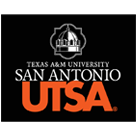Document Types
Panel
Location
UTSA Downtown- La Villita
Start Date
2-23-2024 10:45 AM
End Date
2-23-2024 11:25 AM
Track
Language Attitudes/Ideologies
Abstract
Situated in the deep south Texas borderlands, over 90% of our students are Hispanic or Latino/a/x and the majority are bilingual. That is, most students enrolled across every course at our university are heritage speakers of Spanish. As professional philosophers, we believe that teaching these students should involve engaging them as the bilingual and bicultural students they are while helping them develop philosophical biliteracy. Our panelists are from different linguistic and cultural backgrounds (native speaker, heritage speaker, L2 speaker) but all of us are bilingual, bicultural, and biliterate faculty who have been working together as a team to design and teach philosophy courses using one of three linguistic modalities inspired by the field of SHL: 1) Flexible Bilingual (or Translanguaging) Courses, where the use of Spanish by students is encouraged but not required; 2) Bilingual Courses, where all students must read, write, and speak some amount of Spanish; and 3) Spanish Courses, where all instruction and course work are in Spanish. Each of us has moved toward strong forms of bilingual education, from “a classroom where bilingual [students] are present but bilingualism is not promoted” to “a classroom where formal instruction fosters bilingualism” (Baker and Wright 2021). More specifically, we are using Spanish to teach PHIL courses like “Critical Thinking,” “Introduction to Latin American Philosophy,” or “Chicana and Latin American Feminisms” in ways that are linguistically and culturally sustaining for our local Mexican American community. Our four panelists will discuss why and how we are doing this, the impact these classes have had on our students, and the implications for both the field of Spanish as a heritage language and the discipline of Philosophy. The discussion will be co-moderated by two faculty specializing in Hispanic and Applied Linguistics who are facilitating campus-wide efforts to create Spanish and Bilingual Courses.
Recommended Citation
Stehn, Alex; Paccacerqua, Cynthia; Marrero, Danny; Gomez, Christopher; López García, Dania; and Christoffersen, Katherine, "Teaching Philosophy Classes in Spanish or Bilingually in the South Texas Borderlands" (2024). 11th National Symposium on Spanish as a Heritage Language. 5.
https://digitalcommons.tamusa.edu/heritage_spanish/SCHEDULE/Friday/5
Included in
Language Interpretation and Translation Commons, Latin American Languages and Societies Commons, Philosophy Commons, Spanish and Portuguese Language and Literature Commons
Teaching Philosophy Classes in Spanish or Bilingually in the South Texas Borderlands
UTSA Downtown- La Villita
Situated in the deep south Texas borderlands, over 90% of our students are Hispanic or Latino/a/x and the majority are bilingual. That is, most students enrolled across every course at our university are heritage speakers of Spanish. As professional philosophers, we believe that teaching these students should involve engaging them as the bilingual and bicultural students they are while helping them develop philosophical biliteracy. Our panelists are from different linguistic and cultural backgrounds (native speaker, heritage speaker, L2 speaker) but all of us are bilingual, bicultural, and biliterate faculty who have been working together as a team to design and teach philosophy courses using one of three linguistic modalities inspired by the field of SHL: 1) Flexible Bilingual (or Translanguaging) Courses, where the use of Spanish by students is encouraged but not required; 2) Bilingual Courses, where all students must read, write, and speak some amount of Spanish; and 3) Spanish Courses, where all instruction and course work are in Spanish. Each of us has moved toward strong forms of bilingual education, from “a classroom where bilingual [students] are present but bilingualism is not promoted” to “a classroom where formal instruction fosters bilingualism” (Baker and Wright 2021). More specifically, we are using Spanish to teach PHIL courses like “Critical Thinking,” “Introduction to Latin American Philosophy,” or “Chicana and Latin American Feminisms” in ways that are linguistically and culturally sustaining for our local Mexican American community. Our four panelists will discuss why and how we are doing this, the impact these classes have had on our students, and the implications for both the field of Spanish as a heritage language and the discipline of Philosophy. The discussion will be co-moderated by two faculty specializing in Hispanic and Applied Linguistics who are facilitating campus-wide efforts to create Spanish and Bilingual Courses.


Comments
We have provided names and affiliations for six "presenters" but to be clear: there will only be four panelists (all philosophers). The other two people listed, both linguists and SHL scholars, will serve as co-moderators.